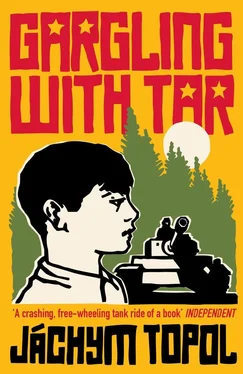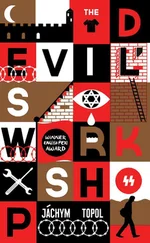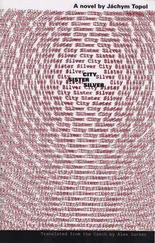It took me just a few hops to get across the road and fly into the field. I dashed about looking for them. I knew I had to find them. If I didn’t find Hanka, it would be terrible. I’d beg the Captain to let her come with our column. Hanka and the other girls might be able to perform in the circus, as Czechs. Why not? I roamed and ran about the field, looking for Hanka, but I couldn’t find her. Had they run away while I was checking myself over behind the tank? I didn’t know.
The women stared at the tanks and the tank men gawped back at them. It was quiet now. The almost still air was riven only by the loud wailing of some kid. The huddle of women, surrounding the one who was trying to soothe the bawling child, moved off towards the forest. Perhaps that was where they lived. Tank columns are equipped with lots of stuff, but nothing for calming screaming infants. The women left.
I never saw Hanka again. Or Mrs Kropek. They did a runner or something. That was the worst thing. I kept losing sight of people. Not like round a bend in a corridor or behind a tree. People were suddenly gone for ever.
The girls in the bushes came crawling out quite quietly. The soldiers were chatting very loudly, and they were laughing and dusting themselves down from top to bottom. The girls who’d crawled out of the bushes went and joined the others in the field. Then they all moved off, leading the children by the hand, carrying the tiniest ones, going further and further away into the dusty field, where there was nothing.
I returned to the lead tank. The ropes were there all right, but Dago was nowhere. He had gone. I was lucky nobody asked about him. After all, he’d been in my care.
The hamlet of Ctiradův Důl was the last stronghold before the final attack on Siřem.
The soldiers, excited by the women, were now hurriedly preparing their arms and equipment. We were about to break into Siřem and destroy all resistance, assuming there was any.
Well, I wasn’t looking forward to that one bit. I wasn’t feeling my best. After all, I’d lost Hanka again. And Dago, who was under my guard.
And to top it all, the Third World War broke out.
The Czechs unleashed it.
Once again, I heard about Commander Baudyš.
It was like this. Captain Yegorov and Gunner Kantariya and several of the NCOs and me were bivouacked in the only cottage that hadn’t been burnt down, and where the Czechs hadn’t even had time to switch off the television. And that, before we went on the attack, was something we welcomed, because the Radio Free Siřem transmitter had stopped transmitting and we lacked any reports from the Siřem military district.
On the Captain’s orders, we surrounded the overheated television, each sitting or squatting down wherever he happened to be.
And we learned that the Third World War had broken out.
The Czech announcer said that the Czechoslovak people had been betrayed. He spoke of Czechoslovaks dying for the civilized world of Western Europe in an unequal contest against the Eastern hordes, all the while expecting that the former would come to their aid. They were standing up to an invasion from Russia’s Asian steppes, just as their forebears had stood up to the invasions of the Tatars, and they were dying with their proud Czech or Slovak heads held high, having believed that the betrayal of civilized people would not be repeated, that there would be no repeat of Munich.
I translated and the NCOs muttered their displeasure and rolled their cigarettes, and then the news continued and now all the tankmen were cursing and swearing, and Kantariya even spat at the television, because it reported in words and pictures that many army corps of the Warsaw Pact nations had struck at the rear of the Soviet Army, alongside gangs of Czech bandits.
Many Polish and Hungarian divisions had torn up the Warsaw Pact and were engaged in battle with Soviet divisions. The numerically weaker Bulgarian and East German corps were fighting their way back to their own frontiers, or surrendering to the Czechs. But more and more new guards units of the Soviet Army kept rolling in and dealing severely with the betrayal.
Then we saw on the screen various army groups in various states of collapse and misery. We didn’t find that funny… But then I stiffened and almost yelped, because there on the screen was a smiling Commander Baudyš!
He sat on a tank, waving a Czechoslovak flag on which was written THE TRUTH PREVAILS… and sitting next to him on the tank was Karel! I’d never have guessed I’d see one of the Bandits again one day.
It was Commander Baudyš and his partisan unit that had attacked West Germany. The thing was that Czech and Slovak partisans were impatiently looking out for the Americans and the forces of the Free World allied in the Atlantic Pact, Nato, and couldn’t wait to get bedded down in suitable spots among the rocks and shoot down Soviet helicopters with American Redeye rockets, but the Americans hadn’t shown up… The Americans and the forces of Nato weren’t showing up… So Commander Baudyš had invaded West Germany to provoke a Third World War, at last giving the Americans and the Atlantic Pact a perfect opportunity and excuse for self-defence, and for stamping on the necks of the Soviet Communist hydra. And our heroic Czech and Slovak lads were making incursions across the western frontier on tanks and even in Soviet-made jeeps, carrying their recoilless Kalashnikovs, to tell the world about Communist atrocities so that the Free World would finally stir itself and not just stand by and watch Czechoslovakia’s heroic resistance against the tide of brutal sovietization, but the world cared damn all and sod all and bugger all about Czechoslovakia.
The Atlantic Pact wasn’t going to upset its tense relations with the Warsaw Pact over Czechoslovakia, so all sides agreed with all sides, and they hurled the rebels right back into the jaws of the Soviet hydra, and the situation changed for our Czech boys in the attack divisions that went into Germany. German bullets started whistling around their heads, and our boys tried in vain to show that their hands were up and that they’d come armed with nothing more than the Idea of Freedom… West German troops and the forces of the Atlantic Pact and American soldiers from bases in West Germany were now driving our boys back towards the Czechoslovak frontier — where, of course, the Soviets were waiting for them, as, having seized control of the situation, they had brought the rebellious Hungarians and Poles to heel. And our boys, who had attacked Germany to provoke a Third World War, were now being thrown back by the Germans towards the Russians, and the Russians were furious at their losses, so our boys really copped it, squashed between German and Russian millstones. The ones who weren’t killed surrendered.
Only a single Bohemian lion did not surrender: Commander Baudyš and his division of specially trained saboteurs… After the renewed Soviet occupation of Prague, and the hero’s death of the statesman Dubček, Czechoslovakia declared her unconditional capitulation, dictated by the supreme authorities of the Eastern Empire. Baudyš and his division alone did not accept it, and now he was hiding somewhere in the disorderly heartland of Czechoslovakia. And the guards units of the Eastern Empire, reinforced by Nato peace-keeping forces, gripped defiant Czechoslovakia in a ring of steel, and salvaged peace for the world and strangled the terrible Third World War before it was born… And the NCOs and Captain Yegorov cheered and clapped until the cottage shook, and they ran outside and gave the good tidings to the others — that it was the end… that there was peace at last!
The sub-machine-gunners shouted for joy and the ones who had steel helmets banged them on the tanks, and the ones who had caps tossed them joyfully in the air. The animals in our column added their neighing and braying to the jubilation, and the sub-machine-gunner standing next to me also tossed his cap in the air, and as he tried to catch it he staggered and I saw blood spurt from his neck, and then we heard a shot and another and then Vrowwww! and the cottage and its overheated television screen disappeared in fire and smoke. The cluster of cheering sub-machine-gunners was reduced to a jumble of crawling, groaning bodies… I looked for any sign of Captain Yegorov, but everyone had withdrawn to the tanks, and any minute now their guns would start spouting flashes, and I would be saved from the attackers, or torn apart by the gunfire… I jumped headfirst into the bushes, then I saw crouching shadows moving quickly around the ruins of the cottage, among the dead and injured. They must be the partisans who’d carried out the attack, but they didn’t look like partisans and even in the thickening gloom it was obvious that they weren’t soldiers of the Czechoslovak People’s Army either… I propped myself up on one elbow and called out weakly, ‘I’m here!’
Читать дальше












